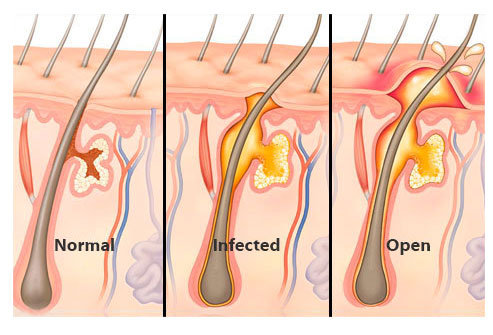
 What’s over a half inch in size, really painful, and bursts into a gross mess? Did you guess that it’s a boil? If you did, you’d be right! The good news is, they aren’t serious (with a few rare exceptions), and typically resolve themselves on their own.
What’s over a half inch in size, really painful, and bursts into a gross mess? Did you guess that it’s a boil? If you did, you’d be right! The good news is, they aren’t serious (with a few rare exceptions), and typically resolve themselves on their own.
What is a boil?
Boils are hair follicles or oil glands that have become infected, in a similar fashion to acne, but on a larger scale. They start out as a painful, hard lump, usually a half inch in size. Over the course of several days they get larger, more painful, and soften. Then a pus pocket forms on top. It will then burst and drain on its own.
How do I treat a boil?
The number one thing you should not do with a boil is poke it with a needle! The boil will come to a head and burst on its own within 10 days. Using a needle will only introduce additional bacteria (either from the needle itself, your hands, or from the surface of the surrounding skin) and make the infection worse. All you have to do is apply warm compresses and soak it in warm water. Doing so will ease the pain, and help it to soften and come to a head much faster. Once it has come to a head, you can repeatedly soak it to encourage it to burst.
When it bursts, use a clean cloth soaked in warm water and gently squeeze out any excess moisture. Then wash the affected area with antibacterial soap, and treat the boil with rubbing alcohol. Slap on a band-aid with some antibiotic ointment and you’re good to go! Just wash it a few times a day to keep it clean and make sure it doesn’t get infected again. You can continue to use warm compresses to relieve any discomfort.
Are there severe symptoms I should be on the lookout for?
While most boils resolve on their own, there are some cases where you should seek medical attention, as prescription antibiotics, or lancing of the boil may be required. These include:
- If you develop a fever
- If the skin around the boil becomes warm, swollen, red, and painful
- This means the infection is spreading
- More boils appear around the original
- Your lymph nodes swell
- The pain is severe
- The boil doesn’t drain on its own
- If you have diabetes, a heart murmur, or any immune system problems (or if you’re on immunosuppressants)
- If you’re otherwise in poor health
If you have a boil and are concerned about it – come see us at the urgent care! We’ll be able to tell if you require additional medical attention.
